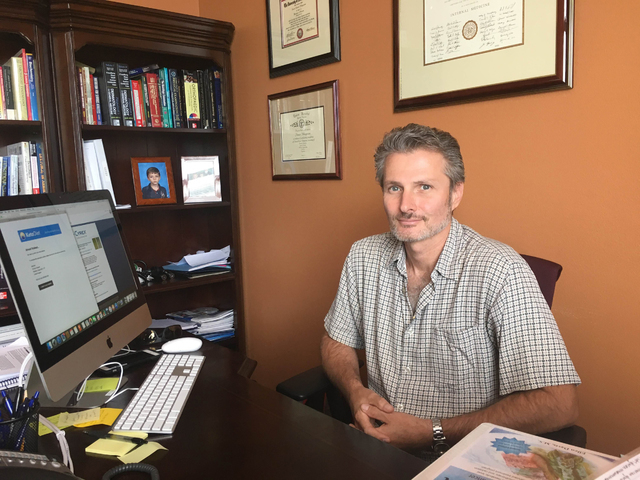Mental illness treatments in Nevada: Doctors focus on full-body wellness
When mental health symptoms become too severe to handle, medication is normally an option.
By teaming up with doctors and pharmacists, people may find the right treatments, but is there anything they should be aware of before turning to medication?
“It’s good to always start at the beginning and get a physical and blood work done first to make sure your systems are working properly,” said Ginger Paulsen, executive director of the National Alliance for Mental Illness Nevada. “A primary care physician can help you from there. For most people it takes time to find something that works for them.”

Treating mental illness with drugs
Psychopharmacological drugs can alter mood, sensation, thinking and behavior. They are normally created from a synthetic chemical compound, which helps to correct imbalanced brain chemistry.
Psychiatric medication comes in seven categories to treat separate mental disorders: antidepressants, stimulants, anti-psychotics, mood stabilizers, depressants, anxiolytics and psychedelics.
For the millions of Americans suffering from depression or anxiety, anti-depressants such as commonly used serotonin can help block a receptor in brain cells that reabsorbs the chemical, making it available to “amplify” its ability to send messages between nerve cells, according to the health website webMD.com. Commonly prescribed medications include Fluoxetine (Prozac), Citalopram, Sertraline (Zoloft), Paroxetine and Escitalopram. Side effects include nausea and vomiting, weight gain, diarrhea, sleepiness and sexual dysfunction.
Sandy Stamates, president of the National Alliance for Mental Illness Nevada, said it’s important to use the same pharmacy for all prescription medicines because they can ensure safety when taking them. It’s also important to note that antipsychotic medicines do not cure these conditions, she said, but rather help relieve symptoms and improve quality of life.
“Never mix medications with drugs or alcohol,” Paulsen said. “Also, if one medication isn’t working, or if you’re feeling better, it’s never a good idea to just stop. Many mental illness crises happen when people go off their medication without the help of their doctor. It can be devastating.”
In general, the National Health Institute reports that roughly 60 percent of people on antidepressants note a significant change in feeling.
Is medication always the right step?
Dr. Armen Nikogosian of Southwest Functional Medicine in Henderson is a firm believer in functional medicine. It’s a concept that emphasizes that everything is connected. The mind is affected by the different organs of the body and vice versa. The gut, for instance, has been linked to the development of Alzheimer’s disease, Parkinson’s disease and other mental disorders.
“Functional medicine is built on the foundation of conventional medicine, but the main thing we look at is the cause of the disease,” Nikogosian said. “There is always a cause for something. We may not find it, but we’re always looking for it.”
Some doctors believe that nutrition, supplements, genetics and lifestyle play a bigger role on a person’s state of being than drugs. A lot of times, the trigger to a mental illness is a nutritional deficiency, according to Nikogosian.
The problem, Nikogosian said, with taking medications is that it could have an effect on a person’s gut, which could have a direct effect on the thyroid. The trouble with functional medicine is that patients may not see direct results until two to three months later, unlike the quick change seen with some drugs.
Some studies show that problems with neurotransmitter production start from the gut before it affects the brain. There is also growing evidence that toxicity, nutritional deficiency, blood sugar control and other dietary factors are highly associated with brain dysfunction. Recognizing this complex connection, functional medicine examines all the factors that may have an impact on the patient’s condition as opposed to conventional medicine, which concentrates only on the disease itself.
Nikogosian takes a detailed look at his patients’ diets and at the health of their gut’s microbiome bacteria by doing a stool analysis. The gut is crucial to functional medicine doctors because it is closely linked to the brain causing depression and anxiety, according to Nikogosian.
He said probiotics and supplements are important to helping people with mental illnesses. Other things to consider are food intolerances that the gut may be sensitive to, thus creating unwanted symptoms. He will help dedicated patients do an elimination diet to see what foods they are sensitive to.
“Vitamin B supplements like folate and niacin have been shown to help mental illness,” Nikogosian said.
He also looks at his patients’ relationships and state of affairs.
“A lot of times, people think that happiness must be a normal state of affair, but there are times when depression and anxiety are normal,” he said.
While he does work with medications, Nikogosian said he’s cautious because of the possible side effects.
Antidepressants and anxiety medications are required by the FDA to carry a “black box warning,” also known as the highest warning available to prescription medications, indicating that antidepressants may increase the risk of suicidal thinking and behavior.
“Results are usually short-termed on most of these medications,” Nikogosian added. “That’s not to say they are worthless — they have a use — but they’re not as fantastic as people think they are.”
Struggling with medications
For some individuals with mental illnesses, such as schizophrenia and bipolar disorder, being medicated is not an option. They may refuse to take medication because they may be unaware of their illness, be wary of the side effects or believe that the medication will do more harm than good.
Nikogosian said antipsychotics may quiet the voices in schizophrenic patients by slowing the brain, but it also makes them feel like they’re “not as smart as they used to be.”
“People have a right to make their own choices,” said Debbie Plotnick, vice president for Mental Health and Systems Advocacy at Mental Health America. “We like to say there are at least two experts in the room — one is the prescriber and the other is the individual who can see how things affect them and how they feel. Medications are very individualized, and it’s important to have insurances offer a full array of medications. That way, people can see what works for them.”
If the insurance doesn’t pay for a certain medicine, Plotnick said patients could work with their doctors to find a program that helps pay for it or they can try to appeal it to their insurance provider.
There are others who experience anosognosia, or the rejection of a diagnosis of mental illness, which may cause conflicts with others and increased anxiety.
The National Alliance for Mental Illness Nevada offers a Family-to-Family program for family members, significant others and friends of people living with mental illness.
For those who forget to take their medications, Paulsen suggests people use reminders on their phones or involve family to help.
“The brain is like any other organ in the body; if it’s not working properly, it’s OK to receive treatment,” Paulsen said. “A lot of people forgo medication because they feel stigmatized, but they shouldn’t feel that way.”
For more information on the National Alliance for Mental Illness Nevada, visit 775-336-3090 naminevada.org.
For more information on Mental Health America, visit mentalhealthamerica.net.
To reach North View reporter Sandy Lopez, email slopez@viewnews.com or call 702-383-4686. Find her on Twitter: @JournalismSandy.
Upcoming Mind Matters story topics:
In July: A look at how mental disorders affect adolescents.
In August: How the Clark County School District offers support for students living with a mental health issue, and a look at mental health care for the 55-or-older population.
In September: What is the process to have someone involuntarily committed in Nevada? A look at the laws and what the options are, also a preview of pending legislation affecting mental health care and existing laws and policies that shape the current system in Nevada.
In October: A look at how the prison system and local law enforcement handle those with a mental health issue, also a look at how we begin to improve the mental health system in Nevada.




























